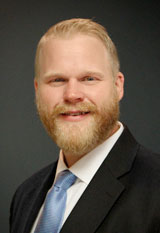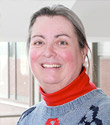Jan 24, 2018
Young Rural Healthcare Leaders Series: Q&A with Adam Willmann
One of four articles in the series Young Rural Healthcare Leaders Share Experiences and Insights.
 Adam Willmann, Age
35
Adam Willmann, Age
35
CEO and President, Goodall-Witcher
Hospital Authority (Clifton, Texas)
Goodall-Witcher Hospital Authority includes a 25-bed CAH, a 43-bed nursing facility, two Rural Health Clinics served by 12 medical providers, a home health agency, and a community-wide fitness center.
Education
- BS in Biomedical Science, Texas A&M University
- Masters of Health Administration, Texas A&M University School of Public Health
Accomplishments and Recognition
- Fellow, American College of Healthcare Executives (FACHE)
- Board of Directors, Texas A&M University System Health Science Center MHA Alumni Association
- Board of Directors, Texas Hospital Insurance Exchange
- Chair, Leadership Development Council; Board of Directors for both Policy Development Council and HOSPAC, Texas Hospital Association
- Board of Directors and invited representative to address U.S. Congressional members, Texas Organization of Rural and Community Hospitals
What was your path to your current position as CEO?
My first CEO job was in a Critical Access Hospital in Georgia. Though my family and I loved it there, one day I got a call from my predecessor, who said he was retiring. He told me, "If you want to come home, I think now's a great time." So, here I am.
But, my path to Goodall-Witcher Hospital Authority actually started very early since I was born in this hospital and grew up in this small, rural town. At age 18, I said what a lot of 18-year-olds say: I'm leaving and I'm never coming back. I thought I would enjoy being a doctor and took what was Texas A&M's pre-med, pre-vet, pre-dentistry curriculum. Because a majority of undergraduates never see those professions, students also had to take an orientation class on what you might do with your degree if you don't get into one of those programs. When the health administration master's program team talked to us, right then and there, I realized that was exactly what I wanted to do.
Later, I met a CEO, Phil Robinson, FACHE, during a summer internship who explained hospital administration this way: when you're a physician, you take care of one person in an exam room at a time; when you're a hospital CEO, you're in charge of making sure that everyone under your roof is getting care. It put a bow around the profession for me because that exactly aligned with my desires.
What has been your most effective innovation at Goodall-Witcher?
'Why not? Why can't we make that change?' I try not to overthink the 'what ifs' and go to the 'why nots," and the 'why not us?'
I struggle with this question because of how I define innovation. In my mind, innovation is like a brand new app for my phone that is a game changer, or when you develop something unique to the world. But, in a broader sense, my innovation here has been to change the organizational mindset, changing the focus to solving our local healthcare challenges. Accomplishing that came by the way of making many other changes. For example, shifting our electronic medical record system. People questioned that change, asking "Why are we getting this thing that's used in hospitals much larger than ours?" I said, "Why not? Why can't we make that change?" I try not to overthink the "what ifs" and go to the "why nots," and the "why not us?" Another change was to sit down with our long-term competitors and break down some barriers. We needed to stop the Friday Night Lights-like wars and work together, yet still remain independent.
What impact did that innovation have on patients, your facility, and your community?
To start, we now have one of the best fully integrated record systems available. That helps us deliver great care to all of our patients, whether they're in the ER, the clinic, the hospital, or the nursing home. We have a continuum of care that I think is unmatched in this area. Collaborating with our competitor, we now have an informal agreement that works for surgical care. We both hired surgeons who work in our respective Critical Access Hospitals but who cover each other's vacations. Additionally, their orthopedic surgeon comes to our hospital and supplements our in-house procedure capabilities. That brings more services to our community, community members can get care locally, and it improves the financial stability of the organization.
As a young leader in rural healthcare, what is the biggest challenge you have faced and how did you overcome it?
We want people to feel something special when they step foot here. I also remind folks there's more to life than just work and we offer more than just a job. We offer a life and a true family.
Developing the confidence to lead change among the same hometown residents who used to lead me. With any CEO transition, turnover happens and then recruiting personnel becomes another challenge. I try to find people with a personal mission that meets our organizational mission. We can't keep up with the Joneses. Providers aren't going to make as much money in Clifton as they might elsewhere. But, I tell them if they join us, they're going to be part of something amazing. Everybody wants to be part of something amazing. So, I show them: Here's what we've done in the past five years and here's where we're going. I tell them that, if they just give me three or five years, we can create something great together. We want people to feel something special when they step foot here. I also remind folks there's more to life than just work and we offer more than just a job. We offer a life and a true family.
What drives your workplace motivation?
First, a personal motivation: In addition to the community we serve, I want to make sure there's high-quality care for my family: my wife, sons, mom, dad, grandmother; I have lots of family here. And my motivation is also to make sure this place has a future, so I can continue to have the opportunity to work here. I love what I do. I have a solid board. I'm living a dream.
What guidance can you offer to young professionals considering rural hospital leadership?
There are those in Washington — or even in our state government — who don't appreciate the caliber of people that we have in rural healthcare and what we are doing. It's important to have highly educated, well-trained administrators in rural areas, especially administrators who are good problem solvers. There's a lot going on with rural healthcare. The challenges may not be any different than in urban areas, but the profit margins are. One less dollar may be all it takes to break the bank. We've got some young, amazing people making it work.
For someone interested in a rural CEO position, to prepare for the job, take on every job regardless how menial it seems. My mentor, Patrick Wallace, and I joke about now, but I did a pro forma on a yogurt machine. I'm going to tell you, it was awesome. Why spend time doing that? Looking back, that project gave me the training for everything I do now.
If you enjoy change like I do, in a rural area you can make change daily, in contrast to a larger organization where even if change is needed in a day, there may be many more individuals involved and change can take three to six months. In a small organization, you can start making changes the same day. Impacting lives with this type of quick change is really attractive.
They'll need to be prepared to take some pretty big risks, knowing that sometimes there are no figures that will help you make a decision. You'll have to trust your gut.
I'd also tell interested individuals that they'll need to be courageous, to take on the challenges. They'll need to run their organization like a true business, using a professional business mindset, but to not be surprised if it doesn't always act like a business. They'll need to be prepared to take some pretty big risks, knowing that sometimes there are no figures that will help you make a decision. You'll have to trust your gut.
Lastly, I'd tell them to expect to sometimes pick up a broom. During a past flu season, we had patients everywhere, we had nurses everywhere, we had housekeeping staff sterilizing everywhere. And there was a hallway mess. So, sometimes you will need to roll up your sleeves and take care of a mess. Sometimes you will need to do anything you can to help take care of patients. (I told the staff, no pictures because I didn't want my wife to know I could work a broom.)
I feel very fortunate that I've found my way into this profession, in this place. It meets what I want in life.

